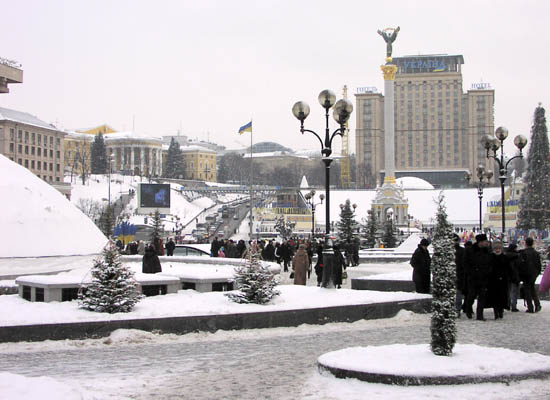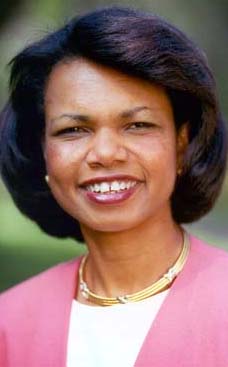2006.03.18: March 18, 2006: Headlines: COS - Ukraine: The Free Lance-Star: Peace Corps Volunteer Rita Botts learns about living in layers in Ukraine
Peace Corps Online:
Directory:
Ukraine:
Peace Corps Ukraine :
The Peace Corps in the Ukraine:
2006.03.18: March 18, 2006: Headlines: COS - Ukraine: The Free Lance-Star: Peace Corps Volunteer Rita Botts learns about living in layers in Ukraine
Peace Corps Volunteer Rita Botts learns about living in layers in Ukraine

In late January, we had temperatures ranging from minus 5 to minus 13 degrees Fahrenheit for several days. One morning, my Ukrainian colleague called to say I shouldn't come to school because of the cold. All of the other teachers would be there. There was no way I was going to be the American who wimped out because of a little chilly weather! Besides, what if it got colder? We were still in the first month of the semester, and winter was far from over.
Peace Corps Volunteer Rita Botts learns about living in layers in Ukraine
An American in Ukraine
Peace Corps teacher from Stafford County learns about living in layers. By Rita Botts
Date published: 3/18/2006
Caption: Winter in Kiev
Ukraine has the largest number of Peace Corps volunteers serving in any country. Many teach English in public schools and universities, while others specialize in business or youth development. A new group of volunteers arrives in Ukraine every six months.
Today in one of my eighth-grade English classes I confiscated two cell phones, handed out half a dozen failing grades, made one student stand at his desk for part of the lesson, and sent another student out of the room. I'm a Peace Corps volunteer in Ukraine, but today I felt more like a drill sergeant than a peacemaker.
Nearly a year ago, when I applied to be a volunteer, I had no idea which country I'd land in. What would life be like without the technology and infrastructure I'd enjoyed in the United States? In the middle of the night, I would wake up and worry about bucket baths, long treks to an outdoor toilet, weeks of eating nothing but yams or a once-a-month call to the States on a battered pay phone.
These turned out to be warrantless fears. Instead, my greatest enemy here is the cell phone, a superstar of technology and infrastructure.
In Ukraine, the average teacher earns between $90 and $100 a month. Very few of my students can ever hope to visit an English-speaking country, or any other country, besides perhaps Russia or Poland. As one teacher told me, "Ukrainians don't live. They exist." But as I stand at the blackboard attempting to make grammar interesting, my students are slyly punching away at flashy phones that cost from $100 to $400.
Despite this irony, I admit I'm enthusiastically part of the craze. Four months ago, when I came to Ukraine, I had never owned a cell phone. Now I've convinced myself that staying in touch with other volunteers and stateside friends and family is essential to avoiding bouts of loneliness and depression. But my phone is woefully uncool compared to my students'--no color graphics, camera or MP3 player.
However, life in Ukraine is not about being cool in my students' eyes.
It's about wearing at least three layers, being married and having kids.
Coping with the cold
In late January, we had temperatures ranging from minus 5 to minus 13 degrees Fahrenheit for several days. One morning, my Ukrainian colleague called to say I shouldn't come to school because of the cold. All of the other teachers would be there.
There was no way I was going to be the American who wimped out because of a little chilly weather! Besides, what if it got colder? We were still in the first month of the semester, and winter was far from over.
"I'm coming," I said.
I dressed in long underwear, knee socks, two pairs of pants, a shirt, two sweaters, a fur coat, fur-lined boots and gloves, a hat and a wool scarf.
I moved toward the door, but was intercepted by my ever-vigilant host mother. I got the Ukrainian pat-down, in which clothing is fingered and fussed over to determine the number of layers. The coat, scarf and gloves came off. (Part of being a volunteer is feeling like a child, as if you don't know how to dress yourself or speak in complete sentences.)
My host mother tied a wool shawl around my chest and meticulously rewrapped me while smoothing, poking and murmuring.
Descending the stairs of our flat block, I felt like a mummy. My eyelashes collected icicles and began to freeze shut as I leaned toward school, but I arrived with all digits intact.
Attendance was so low that we all went home after a few lessons.
Because nearly all children walk to school, snow days don't exist in Ukraine, but school was canceled for three days due to the big freeze. The school director said it hadn't been this cold in a decade.
My host mother kept the oven lit with the door open to supplement our gas-fueled radiators. When I admitted that I was planning a day trip to Kyiv [Kyev], the capital, the next day, she gave me a dark look.
"It's cold!" she said. I could see visions of a frostbitten Rita multiplying in her head. She and her neighbor anxiously tried to convince me to stay home. Fewer buses were running in this sort of weather and I might stand outside forever waiting for one.
I later woke up in the middle of the night feeling sick. Though I quickly recovered, I didn't go to Kyiv in the morning. I lay in bed.
"See?" my host mother later said. "God didn't want you to go to Kyiv!"
Love and marriage
I'm single, but since I've come here, I think it wouldn't be a bad idea to make up stories about my "husband." It's not because of the men, though. It's because of the women.
When I meet someone new--for example, a colleague--the first question is often, "Aren't you cold?" or "Is your flat warm enough?" I always assure the questioner that I'm quite toasty, which means the next 10 times I meet her, she'll ask if I'm cold and if my flat is warm enough. The questions continue.
"Do you have a family?"
"No," I answer.
"Are you married?"
"No."
"Why not?"
When the new acquaintance learns my age, there is concern. Twenty-five and not yet married? Sometimes, despite my resistance, they promise I'll find and marry a Ukrainian man.
Having children
Some Ukrainians believe that if young women don't keep their legs warm or if they sit outside in winter, their ovaries will freeze, resulting in infertility.
"Legs cold?" a favorite colleague recently asked.
I promised her they were fine, which prompted a lecture on the correlation between leg warmth and bearing healthy children. I listened, hesitated, and then decided to tell the truth.
"I don't want children," I said.
"But it's your duty to God!" she cried, shocked. "Besides, who will take care of you when you're old?"
I pondered this excellent question, recalling that nursing homes will be terribly expensive when I reach old age.
Nevertheless, secretly, when I'm outside and free from the sharp eyes of the babushkas (grandmas), I'm a real rebel.
I look around and do reconnaissance for a flower-print handkerchief and straw broom, the uniform of babushkas.
Then I sit on a park bench and freeze my ovaries.
(Rita Botts will write more about her experiences in Ukraine in future stories.)
SEND QUESTIONS or comments to Rita Botts in care of gwoolf@free lancestar.com.
Date published: 3/18/2006
When this story was posted in March 2006, this was on the front page of PCOL:





Peace Corps Online The Independent News Forum serving Returned Peace Corps Volunteers
 | History of the Peace Corps
PCOL is proud to announce that Phase One of the "History of the Peace Corps" is now available online. This installment includes over 5,000 pages of primary source documents from the archives of the Peace Corps including every issue of "Peace Corps News," "Peace Corps Times," "Peace Corps Volunteer," "Action Update," and every annual report of the Peace Corps to Congress since 1961. "Ask Not" is an ongoing project. Read how you can help. |
 | The Peace Corps Library
The Peace Corps Library is now available online with over 40,000 index entries in 500 categories. Looking for a Returned Volunteer? Check our RPCV Directory. New: Sign up to receive PCOL Magazine, our free Monthly Magazine by email. Like to keep up with Peace Corps news as it happens? Sign up to recieve a daily summary of Peace Corps stories from around the world. |
 | Peace Corps suspends program in Bangladesh
Peace Corps Director Gaddi H. Vasquez announced the suspension of the Peace Corps program in Bangladesh on March 15. The safety and security of volunteers is the number one priority of the Peace Corps. Therefore, all Peace Corps volunteers serving in Bangladesh have safely left the country. More than 280 Peace Corps volunteers have served in Bangladesh since the program opened in November 1998. Latest: What other newspapers say. |
 | Invitee re-assigned after inflammatory remarks
The Peace Corps has pulled the invitation to Derek Volkart to join the Morocco Training Program and offered him a position in the Pacific instead after officials read an article in which he stated that his decision to join the Peace Corps was in "response to our current fascist government." RPCV Lew Nash says that "If Derek Volkart spoke his mind as freely in Morocco about the Moroccan monarchy it could cause major problems for himself and other Peace Corps volunteers." Latest: The Ashland Daily Tidings has issued a request for all Peace Corps communications on the case. |
 | Re-envision Peace Corps
Nicholas J. Slabbert says in his article in the Harvard International Review that an imaginatively reinvented Peace Corps could powerfully promote US interests in a period when perceptions of American motives are increasingly relevant to global realignment. His study envisions a new role for the Peace Corps in five linked areas: (1) reinventing America's international profile via a new use of soft power; (2) moving from a war-defined, non-technological, reactive theory of peace to a theory of peace as a normal, proactive component of technologically advanced democracy; (3) reappraising Peace Corps as a national strategic asset whose value remains largely untapped; (4) Peace Corps as a model for the technological reinvention of government agencies for the 21st century; (5) redefining civil society as information technology society. Read the article and leave your comments. |
 | March 1, 1961: Keeping Kennedy's Promise
On March 1, 1961, President John F. Kennedy issues Executive Order #10924, establishing the Peace Corps as a new agency: "Life in the Peace Corps will not be easy. There will be no salary and allowances will be at a level sufficient only to maintain health and meet basic needs. Men and women will be expected to work and live alongside the nationals of the country in which they are stationed--doing the same work, eating the same food, talking the same language. But if the life will not be easy, it will be rich and satisfying. For every young American who participates in the Peace Corps--who works in a foreign land--will know that he or she is sharing in the great common task of bringing to man that decent way of life which is the foundation of freedom and a condition of peace. " |
 | Paid Vacations in the Third World?
Retired diplomat Peter Rice has written a letter to the Wall Street Journal stating that Peace Corps "is really just a U.S. government program for paid vacations in the Third World." Director Vasquez has responded that "the small stipend volunteers receive during their two years of service is more than returned in the understanding fostered in communities throughout the world and here at home." What do RPCVs think? |
 | RPCV admits to abuse while in Peace Corps
Timothy Ronald Obert has pleaded guilty to sexually abusing a minor in Costa Rica while serving there as a Peace Corps volunteer. "The Peace Corps has a zero tolerance policy for misconduct that violates the law or standards of conduct established by the Peace Corps," said Peace Corps Director Gaddi H. Vasquez. Could inadequate screening have been partly to blame? Mr. Obert's resume, which he had submitted to the Peace Corps in support of his application to become a Peace Corps Volunteer, showed that he had repeatedly sought and obtained positions working with underprivileged children. Read what RPCVs have to say about this case. |
 | Why blurring the lines puts PCVs in danger
When the National Call to Service legislation was amended to include Peace Corps in December of 2002, this country had not yet invaded Iraq and was not in prolonged military engagement in the Middle East, as it is now. Read the story of how one volunteer spent three years in captivity from 1976 to 1980 as the hostage of a insurrection group in Colombia in Joanne Marie Roll's op-ed on why this legislation may put soldier/PCVs in the same kind of danger. Latest: Read the ongoing dialog on the subject. |
 | Friends of the Peace Corps 170,000 strong
170,000 is a very special number for the RPCV community - it's the number of Volunteers who have served in the Peace Corps since 1961. It's also a number that is very special to us because March is the first month since our founding in January, 2001 that our readership has exceeded 170,000. And while we know that not everyone who comes to this site is an RPCV, they are all "Friends of the Peace Corps." Thanks everybody for making PCOL your source of news for the Returned Volunteer community. |
Read the stories and leave your comments.

Some postings on Peace Corps Online are provided to the individual members of this group without permission of the copyright owner for the non-profit purposes of criticism, comment, education, scholarship, and research under the "Fair Use" provisions of U.S. Government copyright laws and they may not be distributed further without permission of the copyright owner. Peace Corps Online does not vouch for the accuracy of the content of the postings, which is the sole responsibility of the copyright holder.
Story Source: The Free Lance-Star
This story has been posted in the following forums: : Headlines; COS - Ukraine
PCOL32225
22


















